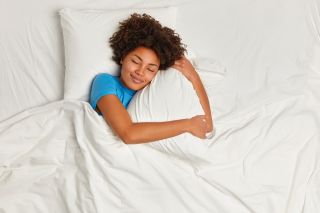Sleep
7 Ways Better Sleep Efficiency Can Fix Your Broken Sleep
Understanding this crucial measure can help you overcome chronic insomnia.
Posted March 25, 2024 Reviewed by Abigail Fagan
Key points
- Sleep efficiency is one of the best indicators of the quality of your sleep.
- Improving sleep efficiency addresses many of the problems that contribute to insomnia.
- Simple steps like record keeping and adjusting time in bed can lead to improved sleep efficiency.

The best-tested treatments for sleep problems tend to be very data-focused: what time you go to bed, number and length of naps, how long it takes you to fall asleep, number of times you awake in the night, and so forth. But one less familiar number is especially important: sleep efficiency.
What Is Sleep Efficiency?
Sleep efficiency is the percentage of time you're in bed that you're actually asleep. For example, if you were in bed for 10 hours and slept for seven hours, your sleep efficiency would be 70%.
You can calculate it by determining how long you were in bed and subtracting:
- the time it took you to fall asleep
- how long you were awake throughout the night
- the time between waking up in the morning and getting out of bed

In our earlier example, you might have taken an hour to fall asleep, been awake for an hour in the night, and laid awake in bed for an hour in the morning.
Why Does Sleep Efficiency Matter?
A high sleep efficiency impacts your nightly sleep in many important ways.
- Sleep Quality. Healthy sleep is about both quantity and quality, and sleep efficiency is a robust indicator of sleep quality. It's a very different experience to toss and turn all night and eke out seven hours of sleep over 10 hours, versus getting a good solid seven hours of sleep. When you're asleep during most of the time you spend in bed, your sleep is consolidated and you'll tend to feel well-rested.
- Sleep Stress. Most people find it frustrating to have a hard time sleeping, and frustration makes it even harder to sleep well. Efficient sleep prevents time awake in bed, reducing the opportunity for feeling stressed about not being asleep.
- Sleep Effort. A healthy sleep efficiency prevents you from exerting a lot of effort to fall asleep, which is a common response to sleeplessness. Hard work usually leads to better results, but not when it comes to sleep. A high sleep efficiency removes effort from your time in bed.
- Sleep Associations. Just as Pavlov's dogs learned to associate a bell with food, your brain forms associations between your bed and the stimuli it's paired with. A low sleep efficiency can lead to links between your bed and anxiety, worry, frustration, effort, being awake, and other non-sleep experiences. The best association you can build is between bed and sleep, so that when you get in bed, your brain automatically expects sleep.
- Insomnia. Not surprisingly, sleep efficiency is closely tied to sleep disorders, especially insomnia. Addressing your sleep efficiency is a key part of evidence-based treatment for insomnia, for the reasons described above.
- Sleep Scheduling. Many experts agree that it's best to aim for a sleep efficiency of 85-90 percent. If your sleep efficiency is less than that, you may need to reduce your hours in bed (see below), which over time typically leads to better quality sleep and higher sleep efficiency.
- Time for Other Activities. Finally, less time in bed means more time for anything else. You'll have more opportunities for enjoyable and productive activities such as work, hobbies, self-care, and time with friends—not to mention exercise, which is linked to better sleep.
How to Improve Your Sleep Efficiency
- Start by determining your baseline sleep efficiency by tracking your sleep for 1-2 weeks. Free apps can make record-keeping easy.
- Then, adjust your time in bed to align with how much sleep you tend to get. Aim to be in bed for your average sleep time plus 30 minutes or so, to allow time for falling asleep and brief middle-of-the-night awakenings. For example, if your average sleep time is seven hours 30 minutes, give yourself about eight hours in bed each night.
- Many people find that they wind up sleeping just as much—or more—when they take steps to improve their sleep efficiency. However, it may take a few nights for your sleep to consolidate. Your brain and body might be used to being awake for long stretches in the night, so there is usually an adjustment period when you start matching your time in bed to how long you actually sleep. It could take a week or so for your sleep efficiency to improve.
- If your sleep efficiency reaches 90 percent or more but you don't feel well-rested, you may need to increase your time in bed. It's safest to add time gradually—for example, experiment with an additional 15 minutes per night and work up slowly from there so your sleep quality doesn't fall apart. Eventually you can find the right balance where your sleep efficiency is high and you wake up feeling refreshed.
If you're having serious and persistent problems with sleep, don't hesitate to seek therapy with a sleep expert. The best-tested treatment is called cognitive behavioral therapy for insomnia (CBT-I).
References
Muench, A., Vargas, I., Grandner, M. A., Ellis, J. G., Posner, D., Bastien, C. H., ... & Perlis, M. L. (2022). We know CBT-I works, now what?. Faculty Reviews, 11.
Reed, D. L., & Sacco, W. P. (2016). Measuring sleep efficiency: What should the denominator be?. Journal of Clinical Sleep Medicine, 12, 263-266.


